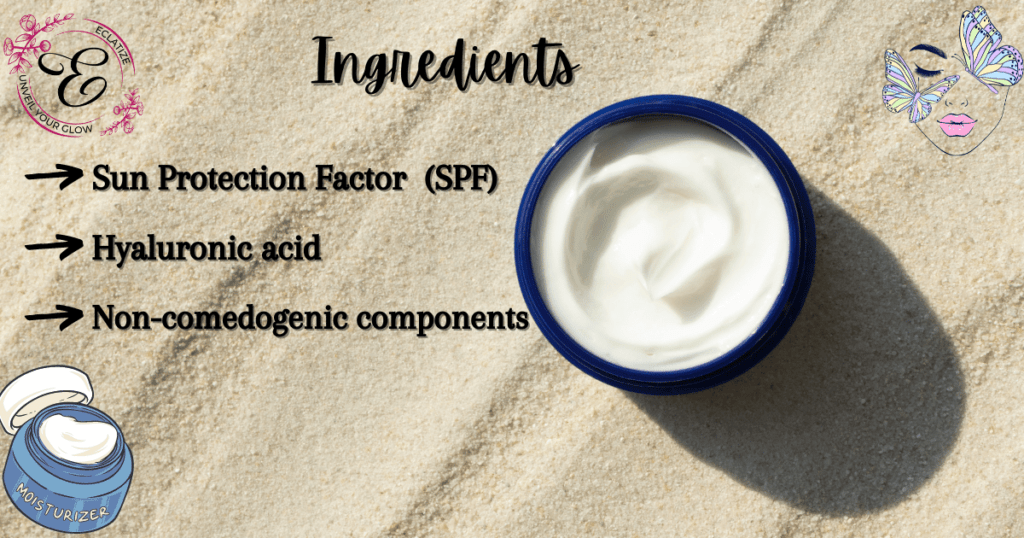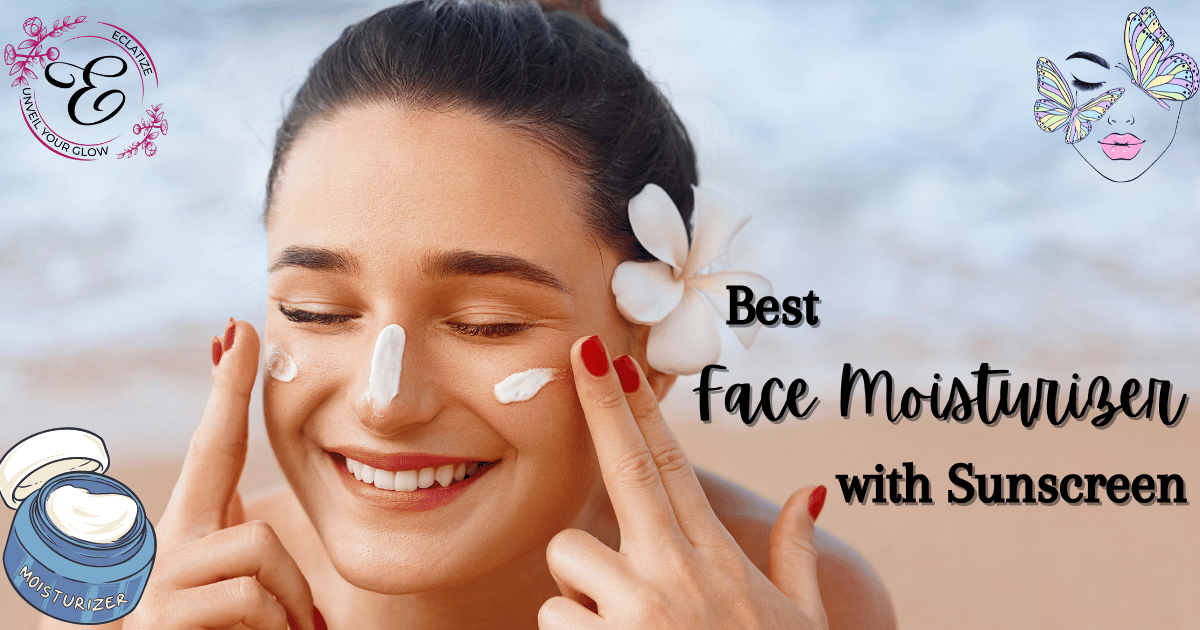In the quest for healthy, protected skin, finding the perfect best face moisturizer with sunscreen becomes pivotal. This essential skincare product not only hydrates but also shields your skin from the harmful effects of the sun’s rays. Understanding the intricacies of these products and how to choose the best one for your skin type is crucial for effective skincare.
Table of Contents
Understanding Skin Types and Sun Protection Needs
Exploring Different Skin Types
Every skin type – oily, dry, combination, or sensitive – has unique needs when it comes to sun protection. Identifying your skin type helps in selecting the most suitable moisturizer with sunscreen that addresses specific concerns without causing adverse reactions.
Impact of Sun Exposure on Skin
Excessive sun exposure leads to various skin issues, including premature aging, sunburn, and an increased risk of skin cancer. The importance of incorporating SPF protection into your skincare routine cannot be overstated.
Essential Ingredients in Face Moisturizers with Sunscreen

SPF
Understanding Sun Protection Factor (SPF) is pivotal. It reflects the extent of defense from UVB radiation. Choosing an appropriate SPF level according to your lifestyle and sun exposure is essential.
Hydrating Ingredients for Different Skin Types
Moisturizers with sunscreen incorporate diverse hydrating ingredients tailored to various skin types. Ingredients like hyaluronic acid for dry skin and non-comedogenic components for oily skin ensure both hydration and non-greasiness.
Factors to Consider When Choosing the Best Face Moisturizer with Sunscreen
SPF Level and Broad-Spectrum Protection
The Sun Protection Factor (SPF) plays a pivotal role in shielding your skin from UVB rays. Selecting an appropriate SPF level based on your skin type, daily routine, and sun exposure is critical. Additionally, opt for a moisturizer offering broad-spectrum protection, effectively safeguarding against both UVA and UVB rays to prevent various sun-induced damages, including premature aging and skin cancer.
Skin Compatibility and Sensitivity
Understanding your skin type and its compatibility with the product is paramount. Whether you have oily, dry, sensitive, or combination skin, choosing a moisturizer tailored to your skin’s specific needs can prevent adverse reactions and ensure effectiveness. Look for formulations explicitly designed for sensitive skin or those labeled as fragrance-free and hypoallergenic to minimize potential irritations.
Additional Benefits and Features
Consider additional features beyond sun protection that the moisturizer offers. Some products come with added skincare benefits like anti-aging properties, antioxidants, or ingredients targeting specific skin concerns such as acne or uneven skin tone. Assessing these extra features allows you to align the product with your skin goals, ensuring it addresses your specific skincare needs.
By evaluating these factors—SPF level and broad-spectrum protection, skin compatibility and sensitivity, as well as additional benefits and features—you can make an informed decision when choosing the best face moisturizer with sunscreen. This approach ensures that the selected product not only provides comprehensive sun protection but also meets your unique skincare requirements.
Top Brands and Products in the Market
Three standout products in the market renowned for their efficacy:
1. La Roche-Posay Anthelios Melt-in Milk Sunscreen
La Roche-Posay’s Anthelios Melt-in Milk Sunscreen stands out for its exceptional lightweight, non-greasy texture that seamlessly blends into the skin. Renowned for providing broad-spectrum protection against both UVA and UVB rays, this sunscreen is particularly suitable for sensitive skin. Enriched with antioxidants, it not only shields from harmful sun rays but also nourishes the skin. Its water-resistant formula makes it an ideal choice for various outdoor activities, offering reliable protection while ensuring comfort.
2. EltaMD UV Clear Broad-Spectrum SPF 46
EltaMD UV Clear Broad-Spectrum SPF 46 earns acclaim as a dermatologist-recommended choice, especially beneficial for acne-prone skin. Its oil-free formulation not only delivers superior sun protection but also contains niacinamide and hyaluronic acid, catering to sensitive or irritated skin. This sunscreen effectively hydrates while calming the skin, making it an excellent option for those with skin sensitivities or prone to breakouts.
3. CeraVe AM Facial Moisturizing Lotion SPF 30
CeraVe’s AM Facial Moisturizing Lotion SPF 30 is recognized for its budget-friendly yet highly effective formulation. This lightweight lotion is fortified with ceramides that bolster the skin’s natural barrier, providing essential hydration while offering sun protection. Suitable for all skin types, it absorbs quickly into the skin, ensuring all-day moisture without leaving a greasy residue. Its ability to protect against sun damage while maintaining skin hydration makes it a reliable choice for daily use.
Application Techniques and Tips for Effective Use
Application Method
Cleanse First: Start with a clean face before applying the moisturizer with sunscreen. This ensures the product adheres well to the skin and offers maximum protection.
Use the Right Amount: Take a sufficient amount of the product, typically a nickel-sized dollop, and dot it across your face, including the forehead, cheeks, nose, and chin.
Smooth and Blend: Gently massage the moisturizer into your skin using upward and outward motions, ensuring even coverage. Pay attention to areas prone to sun exposure, such as the nose, cheeks, and forehead.
Reapplication
Frequent Reapplication: Reapply the sunscreen moisturizer every two hours, especially when exposed to direct sunlight or after swimming or sweating, even if the product claims to be water-resistant.
Daily Integration: Make it a part of your daily skincare routine, applying it in the morning before stepping out, regardless of the weather or amount of sun exposure expected.
Additional Tips
Combine with Other Sun Protection Measures: While sunscreen moisturizers offer essential protection, consider additional measures like wearing wide-brimmed hats, seeking shade, or using sunglasses for comprehensive sun safety.
Pair with Other Skincare Products: Incorporate other skincare products, such as serums or treatments, after applying the moisturizer with sunscreen for enhanced benefits.
Check Expiry Dates: Regularly check the expiration date of the product and replace it when expired to ensure its effectiveness.
Addressing Common Misconceptions about Sunscreen Moisturizers
Let’s debunk some common misconceptions about sunscreen moisturizers:
Myth: Sunscreen’s Relevance Solely in Sunlit Conditions
Fact: Sunscreen is essential year-round, regardless of weather conditions. Harmful UV rays penetrate clouds and can cause skin damage even on cloudy or overcast days. Using sunscreen daily helps protect your skin from potential harm caused by UV exposure, preventing premature aging and reducing the risk of skin cancer.
Myth: Higher SPF Means All-Day Protection
Fact: While a higher Sun Protection Factor (SPF) provides increased protection against UVB rays, it doesn’t mean all-day or prolonged protection. No sunscreen offers complete immunity, and reapplication every two hours, especially after swimming or sweating, is crucial for sustained effectiveness.
Myth: Darker Skin Tones Don’t Need Sunscreen
Fact: People with darker skin tones can still experience sun damage and are susceptible to skin cancer. Though higher melanin levels provide some natural protection, sunscreen remains crucial for preventing skin damage and maintaining healthy skin.
Myth: Applying Once is Sufficient for a Full Day
Fact: One application of sunscreen is not adequate for all-day protection. Reapplication every two hours, or more frequently if swimming or sweating, is vital for sustained effectiveness. Additionally, it’s essential to reapply after toweling off or any activity that might remove the sunscreen.
Myth: Sunscreen Isn’t Necessary When Indoors
Fact: UV rays penetrate windows and can cause skin damage, even indoors. Daily application of sunscreen is recommended as part of your skincare routine, regardless of whether you’re indoors or outdoors, to safeguard against potential UV exposure.
Myth: Sunscreen Alone is Enough for Full Protection
Fact: While sunscreen is crucial, it’s not the sole measure for complete sun protection. Combining sunscreen with other protective measures like seeking shade, wearing protective clothing, hats, and sunglasses enhances overall sun safety.
By dispelling these misconceptions, it’s clear that sunscreen moisturizers are indispensable for everyday skincare, offering vital protection against harmful UV rays and contributing significantly to maintaining healthy, radiant skin.
Conclusion
Finding the best face moisturizer with sunscreen requires understanding your skin’s needs, choosing the right SPF level, considering additional features, and exploring top brands. Incorporating it into your skincare routine ensures long-term skin health benefits.
FAQs
How often should I apply face moisturizer with sunscreen?
Ideally, apply face moisturizer with sunscreen every morning as part of your skincare routine. Reapply every two hours when exposed to direct sunlight or after swimming, sweating, or toweling off to maintain effective protection.
Can I use a separate sunscreen instead of a moisturizer with SPF?
Certainly! Using a separate sunscreen is a viable alternative. Ensure it offers broad-spectrum protection and is suitable for your skin type. However, using a moisturizer with built-in SPF simplifies the skincare routine by combining hydration and sun protection.
What SPF level is ideal for everyday use?
For daily use, an SPF of 30 to 50 is generally recommended. However, the ideal SPF may vary based on factors like your skin type, location, and sun exposure duration. Consult a dermatologist to determine the most suitable SPF for your skin needs.
Are there any side effects of using face moisturizers with sunscreen?
In general, face moisturizers with sunscreen are safe for regular use. However, individuals with sensitive skin may experience mild irritation or allergic reactions to certain ingredients. Always perform a patch test before using a new product, and opt for formulations labeled as hypoallergenic or suitable for sensitive skin.
Do face moisturizers with sunscreen work for all skin types?
Face moisturizers with sunscreen are available in formulations catering to various skin types—oily, dry, combination, and sensitive. It’s crucial to choose a product tailored to your specific skin needs to ensure effectiveness and prevent adverse reactions.

